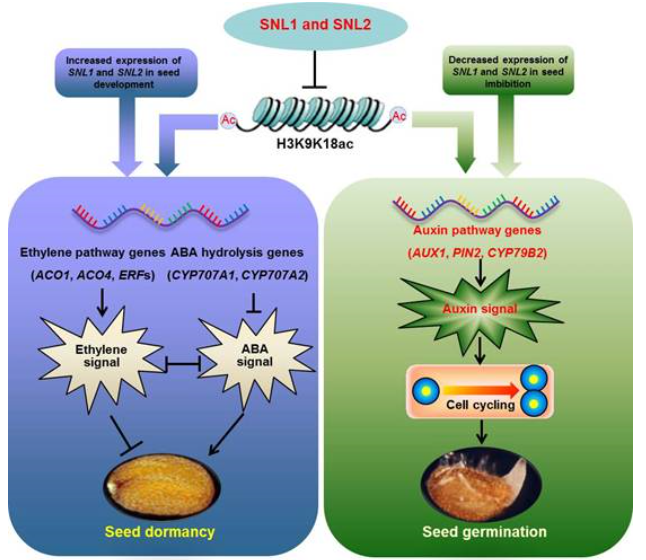
Seed dormancy and germination represent a major transition switch of plant development from reproductive to vegetative growth. Phase transition is often associated with activation and silencing of diverse sets of genes. Epigenetic regulation mediated by histone modification might play a key role in this process.
Pro. LIU Yongxiu from the Institute of Botany of the Chinese Academy of Sciences and his colleagues identified Arabidopsis SNL1 and SNL2 as new epigenetic regulators of seed dormancy and germination, and uncovered the molecular regulatory mechanism behind.
They previously reported that SNL1 can bind histone deacetylase HDA19 to regulate histone H3K9K18 level and gene expression. Loss-of-function of SNL1 and SNL2 causes changed gene expression in ABA or ethylene pathway, and further increases antagonism of ethylene to ABA, which reduces seed dormancy.
The new study indicates that loss-of-function of SNL1 and SNL2 can also result in increased expression of auxin-related genes such as AUX1, and further enhance the auxin level and distribution in the radicle and activate cell division mediated by CYCDs, which causes increased seed germination speed in snl1snl2.
Their work revealed that how histone deacetylation by SNL1 and SNL2 positively controls seed dormancy and negatively regulates seed germination speed, which might be very helpful for molecular breeding to create new crop cultivars with good germination and proper seed dormancy.
These results were recently published in Nature Communication and Plant Cell.
This work was supported by the National Basic Research Program of China, and the National Natural Science Foundation of China.

A hypothetical model for the regulation of seed dormancy and germination by SNL1 and SNL2 (Image by IBCAS)

86-10-68597521 (day)
86-10-68597289 (night)

86-10-68511095 (day)
86-10-68512458 (night)

cas_en@cas.cn

52 Sanlihe Rd., Xicheng District,
Beijing, China (100864)

